#fwd50
Explore tagged Tumblr posts
Text
Week 20: Learn& Test& Build& Repeat
Nov 4-8, 2019
Monday
The team was a bit slow to reconvene on Monday after a weekend together at CANUX. We did a NextGENTravel team-wide retrospective on last week’s Design Sprint.
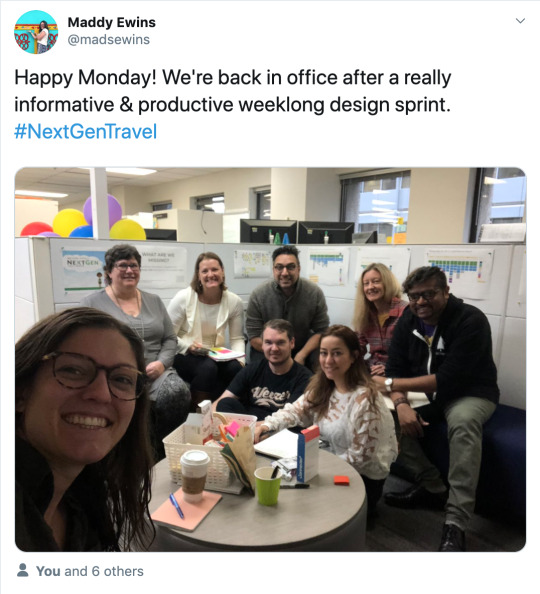
Tuesday
Tuesday officially kicked off the FWD50 conference here in Ottawa.
According to the organizers, FWD50 is “more than an event. It’s a conversation between public and private sector about what we can be when we steer progress towards our better selves.” This three-day event featured a variety of speakers talking about digital transformation, particularly in the public sector.
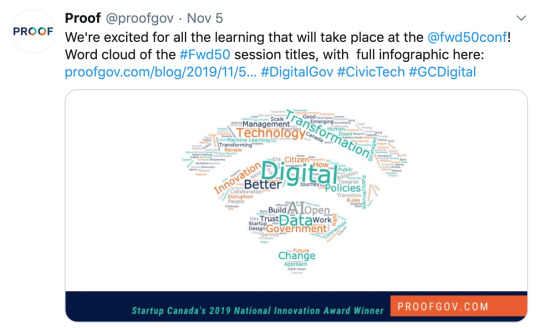
A sampling of Tuesday sessions topics included:
Governing From The Edges: Digital Change, Inclusion And Impact In British Columbia
The Good, The Bad And The Ugly Of Government Of Canada Innovation Work
Technology, Trust And Talent For The Digital Age
Exploring Next Generation Citizen Experience
But for all the innovators onstage at Aberdeen Pavilion, we were most excited about what was queued up that evening at the Orange Art Gallery. Three of the four current Code for Canada cohorts presented project updates at a loosely-affiliated offsite Open House.
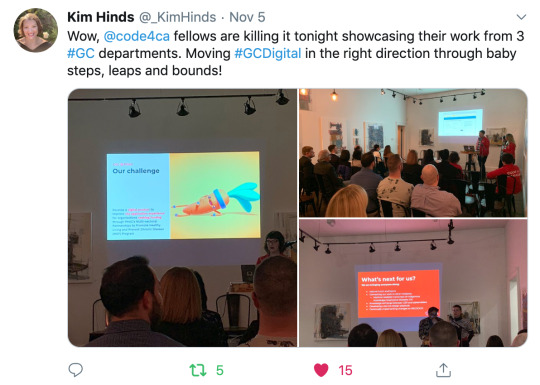
Working on the relatively short presentation (10ish minutes) was a great exercise for the team. What did we want to leave the audience with? We reflected on some of the powerful presentations we’d seen in the past, and tried to bring the audience on a journey (and not just b/c our challenge is travel-related). Giving presentations can sometimes be daunting, but this was a great opportunity to talk about our work in a safe, supportive environment. As we talked of some of the existing challenges travellers face, there were so many nodding faces in the crowd! It was a great reminder that the work we’re doing can really impact people’s abilities to do their work.
Also, Mike decided to step up our presentation style with coordinated t-shirts, which were a big hit! More than one person asked us where they were from, so if this whole tech thing doesn’t work out post-fellowship, we may have a new business idea to pursue 😎

Wednesday
With Tuesday night’s presentation behind us, we were able to settle in and focus a bit more on the conference itself.
The day kicked off with CDS’ Aaron Snow talking about The Art of the Possible. I basically retweeted the entire presentation :-) Later we got a chance to sit in on David Eaves’ session about Digital Transformation Strategies from across the world. As part of our Code for Canada onboarding, we’d had the chance to spend a day with David, so we were familiar with his rapid-fire presentation style. I still think I only really comprehend a portion of his material, but it keeps me thinking for a long time after.
I was really inspired by the presentations by Shu Yang Lin about the civic tech community in Taiwan, and blogged more extensively about it over on my medium blog: What can we learn from the civic tech community in Taiwan about public discourse and engagement?
Some of Wednesday’s great sessions included:
The PIA Review
Prototyping Future Democracy
Open Data For Justice: Tracking Down NYC's Worst Slumlords
Policy Making For Nobody
Digital Transformation Strategies from Around the World
Thursday
Things were a bit slower on Thursday morning for some of us. After the Code for Canada-hosted breakfast meetup, we gaggle of fellows and Code for Canada staff gathered and chatted on some of the comfortable couches around the space.
This was definitely the type of conference where you could see folks who didn’t attend any of the informational sessions, and just used the time to connect with other government innovators. Our track jackets made us noticeable in the crowd, and let us finally connect with some #GCDigital folks we only know off Twitter. (Hi Rob!)
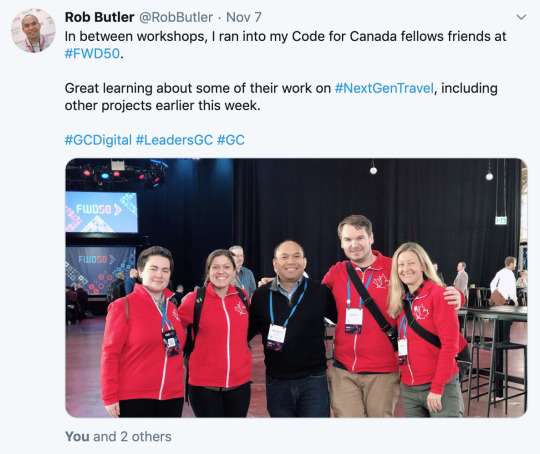
A few of the sessions I managed to jump into were Failing FWD: Lessons In Building Digital Teams And Products with the Ontario Digital service team, and Digital Disruption: Fundamentals, Business, & Execution with CIOs from three departments within the federal government.
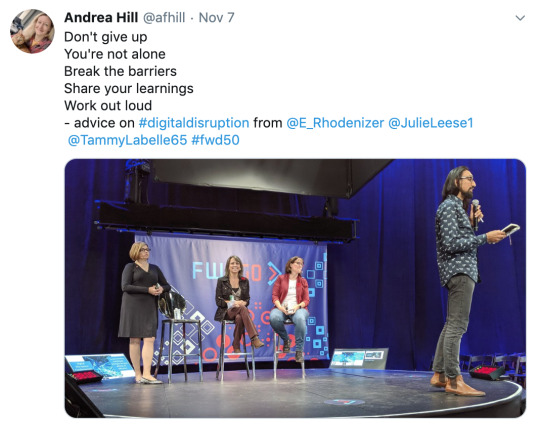
The MC for this session was Sagar from Code for Canada, and he pointed out that each of the three departments (PSC, PSPC and TC) have each hosted fellowship teams in the past. Coincidence?
The CIO session was pretty interesting, to see the leaders of these different departments at different stages along the journey. It was a nice wrap-up and reminder of the week: there’s a lot of ‘best practices’ being circulated and shared, but the gap between theory and practice can be huge.
Friday
Even though FWD50 officially wrapped up on Thursday, we managed to wrangle an invite to a “Rules as Code” working group session at the Canada School of Public Service. The speaker, Pia Andrews, participated in many sessions throughout the conference, and this was a relatively smaller audience as she went over some high-level topics and then answered open questions. Mike happened to pick the seat immediately next to Pia, and then the two Aussies chatted a bit after the session was over. Mike told her that he’d connected with the Code for Australia team that’d worked on Rules as Code, and it turns out it had been Pia who’d brought that team in. I suppose it is a small world! (Mike wrote about Rules as Code a few months ago)

Then in the afternoon we fellows congregated for a retro and offsite. It’s been a busy few weeks, and we wanted to recalibrate on how we were feeling about our team and our project. We really do get along well, and I value my teammates. It’s somewhat hard to believe that we’ve known each other for less than 6 months. There is a lot of mutual respect and care. I consider myself very fortunate to have Mike and Maddy on my team ❤️
3 notes
·
View notes
Text
"If we've learned anything from this pandemic"
*There must be a thousand stories of this kind. And, in this case, it's all about the government of Canada, a G-7 major industrial power, becoming a kind of epiphenomenon of a Big Tech platform.
*This sounds very dull (because Microsoft always sounds very dull) but it's consequential. Events have played into the hands of the tech majors, networking and remote-working developments that might never have happened at all are being hastily slammed into place, and -- not to put too fine a point on it -- there's no sign of the Covid19 pandemic ever going away.
The Permanent Covid scenario is a bizarrely transformative prospect, about a hundred times as radically disruptive of human relations as any "Smart City" or "Internet of Things" project. It substitutes glass screens for shared breath.
If we’ve learned anything from this global pandemic, it’s that digital technology and data are truly critical infrastructure to enable business resiliency and continuity for all governments as they adapt sudden and unexpected changes to “normal” ways of delivering services. With a digital transformation journey already underway, the Government of Canada was able to swiftly pivot operations to deliver critical citizen services securely while simultaneously transitioning approximately 250,000 Federal Public Servants to remote work. To learn more about how they have adopted these changes in the delivery of services, register for Forward 50 (FWD50), taking place virtually November 3 to 9. Over the past few months, we have seen incredible stories of resilience and adaptation from governments from coast to coast, that is only possible when you approach challenges with a growth mindset. We are working with them to provide the technology and infrastructure needed to enable remote government access, empower cross-agency collaboration, and deliver trusted secure services for this accelerated digital transformation. Although the task was daunting, critical services remained accessible to both government employees and Canadians, all without sacrificing security or productivity. The National Research Council of Canada’s Industrial Research Assistance Program (NRC IRAP), in collaboration with the Innovation, Science, and Economic Development (ISED)’s Innovative Solutions Canada (ISC) program, launched a challenge to Canadian subject matter experts (SMEs) for great new ideas to address COVID-19 needs in areas like diagnostics and testing, patient monitoring and tracking, sanitization and personal protective equipment. This required the development of a new online application portal, through which SMEs could register their technology to assist Canada’s COVID‑19 response. By using Microsoft Dynamics 365 and Power Platform cloud solutions, the NRC was able to quickly create a new simplistic online portal that allowed Canadian SMEs to submit their proposed solutions in record speed. On April 22, 2020, the application portal went live – only five days after the program was officially announced. By the week of May 11, 2020, contracts were being put in place with recipients and first deposits were made.
In the healthcare sector, the Newfoundland and Labrador Centre for Health Information moved nearly 4,000 healthcare workers to an Azure Virtual Desktop Environment and Microsoft Teams within five days. This provided their teams with a secure centralized repository for all COVID-19-related guidance, data, and information. Healthcare workers were able to screen patients for COVID-19 virtually, and their supply chain department can now order supplies remotely to ensure frontline workers have the resources they need to stay safe.
Nunavut is 2 million square kilometers and home to 38,000 people in 25 communities across three time zones. With a population as spread out and remote as this, communications, technology, and access to government services are critical. Once the COVID-19 pandemic hit, the Government of Nunavut leveraged the cloud to execute three years of digital transformation plans in just three weeks. Public sector employees in Nunavut are providing citizens with improved and expanded secure access to critical services....
4 notes
·
View notes
Text
Week 17: Prototypes, digging into data, and exploring different recruitment methods
Week 17 | October 15-18
Monday
Monday was a federal holiday here in Canada, so we took some time to re-energize and spend time with family and friends. I’m grateful for the four months we’ve spent with our partners so far, all the wonderful, dedicated, and inspiring folks I’ve met, and all the learnings shared by others.
Tuesday
Things are ramping up over the next few weeks! We’ll be at CanUX (Nov 1–3) and FWD50 (Nov 5–7). Our government partners are also running a weeklong design sprint that we’ll be participating in.
We wanted to carve out time to open our doors, and invite others to poke and prod at our ideas. In light of all the upcoming events, we decided to move our Office Hours UP to Tuesday October 22nd, 11am–3pm. Please join us at the NAC if you can!
Mike and I broke ground on Tuesday trying to get MongoDB running locally, so we can be better prepared to handle larger data sets.
If you have successfully worked with large datasets of Protected B data before, please reach out! I’m looking for ways to handle, load, and query data and gather insights, beyond massive Excel spreadsheets.
I’m available on Twitter @madsewins, or email at maddy [at] codefor [dot] ca.
Andrea kicked off a line of investigation into the state of payments for travel.
Wednesday
Mike attended the design community of practice, hosted and held at CDS, and learned about various recruiting techniques.
As a team we discussed how we can test and recruit users through more channels like intercept interviews, one-on-one interviews, by setting up at other events like open houses and conferences, and through asynchronous surveys.
Thursday
Andrea and Mike have been ruminating on the concept of a travel estimator/calculator. We built an early iteration of this during our Code for Canada onboarding, but we didn’t test it with users. They’re going to take what we’ve already built, clean up the interface and content, and test it with users to understand whether this could be a useful tool.
Friday
I reconnected with Dan Tse, former Code for Canada fellow, and current product manager at CDS! He very kindly shared a piece of Starter Stuart, his sourdough starter, so my roommate can make delicious sourdough bread!
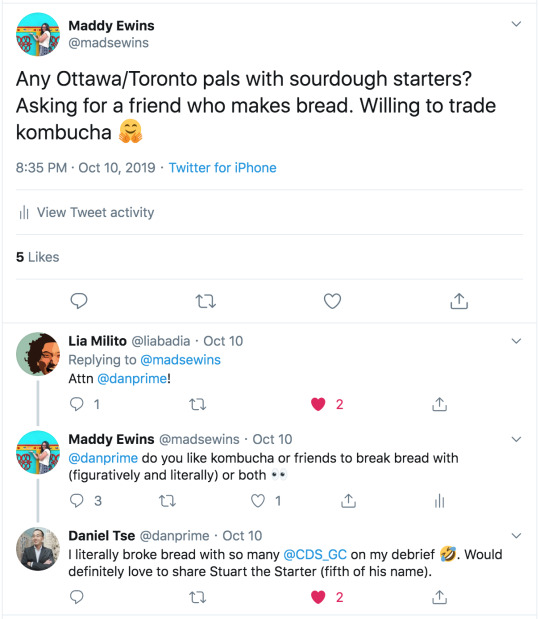
https://twitter.com/madsewins/status/1182454724148248576
A very good Friday, indeed.
Closing thoughts
This was one of the best weeks I’ve experienced so far in this fellowship. There was something magic in the air. I hate mornings, and I got up early for the gym and morning meetings almost every single day this week. And I felt invigorated and energized, to boot.
As a product manager, it’s incredibly rewarding to see my team taking ownership and pushing forward their initiatives – whether it’s research or design or prototyping or teaching others or connecting with other departments/organizations – and this inspires me daily. We’re really jelling as a team, and moving faster than we have before, enabled by established communication channels and frameworks in place that allow us to share and empower each other’s work while championing our own projects/initiatives.

And of course, bringing user’s voices to the table when we can, and in lieu of that, advocating for the user’s voice, to keep us moving in the right direction -- to build a user-centric travel solution for the Government of Canada.
3 notes
·
View notes
Text
Week 21: Back to the office
Week 21 | Monday November 11 – Friday November 15
After a solid couple of weeks of Design Sprinting, CanUX and FWD50 this week is to regroup and a chance to get some heads down time.

This is a short week as we took Monday off to observe Remembrance Day.
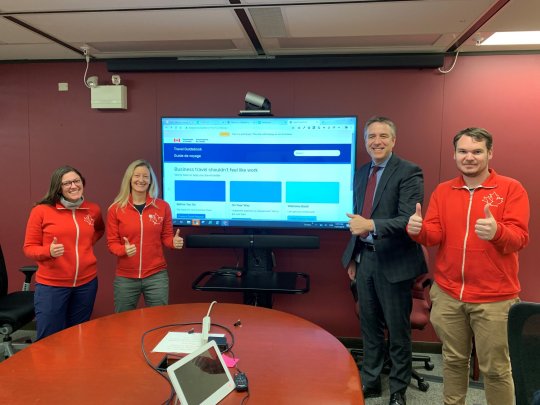
We had the opportunity to visit the Associate Deputy Minister Michael Vandergrift to talk about the future of GC Travel and show him some of our experiments. He also broke in his new @DMA_PSPC twitter account by tweeting about the meeting.

I was heads down coding the Travel Estimator, a prototype idea we've had kicking around for a while now. The estimator helps you plan your budget by pre-populating meals and per-diems, city rate limits and other accommodation allowances. Developing this prototype actually meant updating an API experiment we’d created as well.
Next week, we’re testing with users!

1 note
·
View note
Text
5th Month Update: Two Conferences & One Report
FWD50

All the Code for Canada fellows were invited to FWD50, a three-day government innovation conference. I decided to use the majority of my time in one-on-one conversations. Though initially I had no goal with these conversations, one of the first conversations turned into a discussion on innovation and why it’s so tough in government. I decided I would dedicate the rest of my time at the conference discussing this topic in one-on-one conversations with whoever would agreed to talk with me. I took notes and told participants I would email them my report if they so desired. It was a nice way to make a connection and to keep the connection alive.
You can find the report here, and the organized raw data here.
VueConf Toronto 2019
I also attended VueConf Toronto 2019, which is an annual conference for the popular javascript library Vue.js. The talks were really for developers, which was great. I got some great insight into unit testing and using GraphQL, both of which are crucial for my future work in web development. What is more, I got to meet the team behind the Vue component library Vuetify. It was great to talk with them and put names to faces, especially after having communicated with them via Discord (a chat service) or almost a year.

Tool
Finally, I would like to add that I was able to attend a Tool concert on my last night in Toronto. Though not a huge Tool fan, I had a feeling it would be quite an experience, and the band did not let me down. Their massive songs and artistic, vague storytelling are reminiscent of what I have seen of Pink Floyde. In other words, it was great to get a piece of that before it's gone forever.

1 note
·
View note
Text
Latest: On the Government Tech Trail @ FWD50
I went to Ottawa for FWD50 – Canada’s digital government conference. My goal? Find out what’s what and who’s who in the world of Canadian government innovation, and see if this country I’m so fond of truly has it together when it comes to creating an inclusive future for all its citizens. Read the full story on Betakit
3 notes
·
View notes
Link
Our FWD50 experience and our presentation at the event has given us insights into how to proceed as a team, shone feedback our process, and reinvigorated our energy for this next phase in our work!
0 notes
Text
4 June 2021
Not feeling 100%?
This is more anecdote than data, but I feel like I've been seeing a lot of clustered bar charts (where you have a number of bars, for different series, bunched together in each category) with quite a lot of bars per category recently.
This sort of thing:
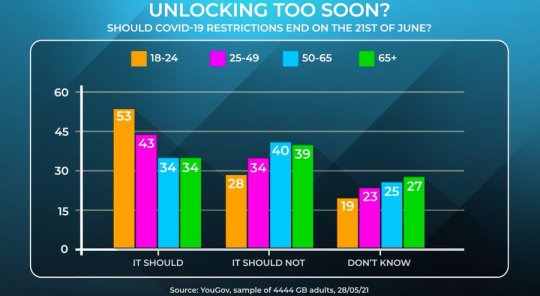
Lest I risk being stripped of my Peston Geek of the Week badges, there isn't anything particularly wrong with this - it just happened to be one example I noticed this week! But personally, I find four bars per category a bit much - I don't think the key stories are as easy to read as they might be. (I should confess my own sins at this point.)
In instances like this one - where the results for a single age group will add up to 100% - I think there's an obvious alternative: a 100% bar chart.
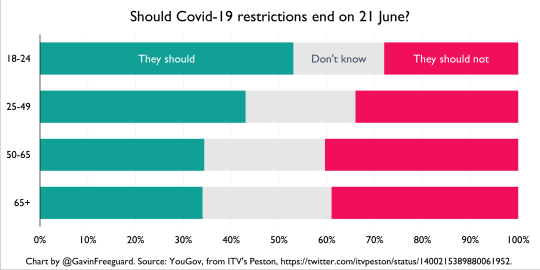
I think this makes the same point - that attitudes to lifting lockdown divide along age lines - more clearly. The thing you might lose is being able to easily compare should/should not for a particular age group, but that's not the main point being made and (personally) I think that takes some time with the original anyway.
Again, there's nothing particularly wrong with the original in this instance. But I've definitely seen more egregious examples, where the number of clustered columns becomes a bar to understanding the data.
Some initial thoughts on other subjects:
DB I thoroughly enjoyed last night's Data Bites geo-special, which you can watch as-live here (and will appear in slightly edited form here). I even included a chart-based quiz - question here (it does get there eventually), answer here. We'll be back on Wednesday 7 July with the next one, and then back on 8 September after a short summer break.
VPs Reports (Meta data, below) suggest the government has backtracked on many of its 'vaccine passport' plans for domestic use. (Rumours government will leave much to the free market are still a concern - government needs to provide clarity and be wary of harms, whoever is developing such systems.) Here's the Ada Lovelace Institute report on vaccine passports I was involved with.
GPDPR Also below are many links about the planned General Practice Data for Planning and Research, a new NHS Digital initiative to use patient data, which is now starting to become A Thing in the press.
LN If you're interested in data sonification, a new podcast - Loud Numbers - is launching with a whole festival on the topic this Saturday. Here are my collected sonifications for the Institute for Government podcast (which I've been saying I'll write up for about a year and a half now...)
ODI There are some great jobs - including researcher and senior researcher roles - going at the Open Data Institute, where I'm a special adviser (but don't let that put you off).
OGP NAP If you'd like to get involved in shaping the UK's next national action plan for open government, remember you can sign up here.
CogX And last but not least, I'm delighted to announce I'll be chairing a session on 'AI Governance: the role of the nation in a transnational world' at this year's CogX at 1pm on Wednesday 16 June.
W:GC will be taking a break next week, and perhaps the week after if I'm feeling really decadent. Remember there are 100+ other data newsletters, podcasts or event series you can sign up to here.
Have a great weekend/week/fortnight
Gavin
Enjoying Warning: Graphic Content?
Tell your friends - forward this email, and they can:
Subscribe via email
Follow on Twitter
Follow on Tumblr
Or:
Buy me a coffee (thank you!)
Follow me, Gavin Freeguard, on Twitter
Visit my website (I'm available for work!)
Today's links:
Graphic content
Viral content
Peru has world’s worst per capita Covid toll after death data revised (The Guardian)
Pretty big validation... (John Burn-Murdoch)
Covid-19 deaths in Wuhan seem far higher than the official count (The Economist)
This is an analysis of the rate of growth of the "delta variant" (Alex Selby)
COVID-19: Indian variant now dominant in a fifth of areas in England - do you live in one? (Sky News)
How the Indian Covid variant has surged in England* (New Statesman)
Side effects
Covid catch-up plan for England pupils ‘pitiful compared with other countries’ (The Guardian)
How England’s school catch-up funding falls £13.6bn short* (New Statesman)
Concerns about missing work may be a barrier to coronavirus vaccination* (Washington Post)
COVID-19 passports: Britons are still in favour even as government scraps plans (YouGov)
Most people in UK did not work from home in 2020, says ONS (The Guardian)
UK
UK's culture war divisions exaggerated but real, say public – as shown by views on equal rights, cultural change and class, and online bubbles (The Policy Institute at King's College London, Ipsos MORI)
Lewis Baston: London voting patterns 2021. Not so much a doughnut as a swirl (On London)
Labour, not the Conservatives, was the largest party among low-income workers in 2019* (New Statesman)
The Greens are on the march. Who should be afraid?* (New Statesman)
Gender in public life (IfG)
Is this the beginning of the end of marriage? (Tortoise)
US
Small share of US police draw third of complaints in big cities* (FT)
Biden Targets Racial, Social Inequities With Vast Spending Push* (Bloomberg)
Hunger has declined dramatically across America in the past year* (The Economist)
NYC’s School Algorithms Cement Segregation. This Data Shows How (The Markup)
The Persistent Grip of Social Class on College Admissions* (The Upshot)
Building a Home in the U.S. Has Never Been More Expensive* (Bloomberg)
Nature, environment, energy
Cicadas, insecticides and children* (The Economist)
Corporate-led $1bn forests scheme is ‘just the beginning’* (FT)
European Banks’ Next Big Problem? The CO2 in Their Loan Books (Bloomberg)
How an Insurgency Threatens Mozambique’s Gas Bonanza* (Bloomberg)
Everything else
English clubs are dominating European football once again* (The Economist)
Unpacking the 2021 Digital Government Survey (FWD50)
#dataviz
A collection of visualization techniques for geospatial network data (GEOSPATIAL NETWORK VISUALIZATION)
Reconstructing the Neighborhood Destroyed in the Tulsa Race Massacre* (New York Times)
Meta data
Viral content
NHS Covid app signs £10m six-month contract extension with developer Zühlke (Public Technology)
The UK’s response to new variants: a story of obfuscation and chaos (BMJ)
Exclusive: UK vaccine passport plans to be scrapped* (Telegraph)
Introducing Covid certificates is a ‘finely balanced’ decision, says Gove (The Guardian)
SCOTTISH LOCAL GOVERNMENT DURING COVID-19: DATA NEEDS, CAPABILITIES, AND USES (Urban Big Data Centre)
Sharing data to help with the Covid-19 vaccination programme (DWP Digital)
How Modi’s fraught relationship with pandemic data has harmed India* (FT)
All those pub apps you’ve downloaded are a privacy nightmare* (Wired)
Losing patients?
Our perspective on the new system for GP data (Understanding Patient Data)
Helen Salisbury: Should patients worry about their data? (BMJ)
Your NHS data will be quietly shared with third parties, with just weeks to opt out – GPs like me are worried (i)
Dear #research, People are opting out in droves – Matt Hancock’s data grab, facilitated by NHSX, is damaging your work (medConfidential)
Matt Hancock has quietly told your GP to hand over your health data. Why? (openDemocracy)
Plans to share NHS data must be reconsidered* (FT)
GPs warn over plans to share patient data with third parties in England (The Guardian)
The Guardian view on medical records: NHS data grab needs explaining (The Guardian)
Your medical records are about to be given away. As GPs, we’re fighting back (The Guardian)
UK government
Government Digital Service: Our strategy for 2021-2024 (Strategic Reading)
Geospatial Commission sets its 2021/22 priorities (Geospatial Commission)
Office for Statistics Regulation Annual Business Plan 2021/22 (OSR)
Office for National Statistics: the number-crunching whizzes keeping Britain afloat are the unsung heroes of the pandemic (Reaction)
Digital Strategy for Defence: Delivering the Digital Backbone and unleashing the power of Defence’s data (MoD)
Introducing a Head of Digital role to DfE (DfE Digital and Technology)
Why we’ve created an accessibility manual – and how you can help shape it (DWP Digital)
Working in data, insight and user research roles at GOV.UK (Inside GOV.UK)
How to make hybrid or ‘blended’ meetings work for your team (MoJ Digital and Technology)
AI got 'rithm
How soft law is used in AI governance (Brookings)
The race to understand the exhilarating, dangerous world of language AI* (MIT Technology Review)
Can AI be independent from big tech?* (Tortoise)
Sentenced by Algorithm* (New York Review of Books)
Google says it’s committed to ethical AI research. Its ethical AI team isn’t so sure. (Recode)
Facebook’s AI treats Palestinian activists like it treats American Black activists. It blocks them.* (Washington Post)
Privacy, people, personal data
Privacy group targets website 'cookie terror' (BBC News)
EU to step up digital push with digital identity wallet (Reuters)
ICO call for views: Anonymisation, pseudonymisation and privacy enhancing technologies guidance (ICO)
Data isn’t oil, whatever tech commentators tell you: it’s people’s lives (The Observer)
Everything else
In big tech’s dystopia, cat videos earn millions while real artists beg for tips (The Guardian)
Rescuers question what3words' use in emergencies (BBC News)
Gadgets have stopped working together, and it’s becoming an issue (The Observer)
German Bundestag adopts autonomous driving law (The Robot Report)
Code is cheap; ignorance is costly (Matt Edgar)
The internet is flat. (Galaxy Brain)
Opportunities
EVENT: AI Governance: the role of the nation in a transnational world (CogX)
Full programme
EVENT: Special Topic Meeting on R/local R/transmission of Covid19 (Royal Statistical Society)
EVENT: Deploying algorithms in government (Global Government Forum)
EVENT: Emerging approaches to the regulation of biometrics: The EU, the US and the challenge to the UK (Ada Lovelace Institute)
SURVEY: Help to shape the National AI Strategy (AI Council, supported by The Alan Turing Institute)
JOB: CEO (Advanced Research and Invention Agency)
BEIS seeks chief for research agency championed by Cummings (Civil Service World)
JOB: Chief Digital Officer for Health and Care for Wales (Health Education and Improvement Wales, via Jukesie)
JOB: Head of Data Strategy (Companies House)
JOB: Head of Data Policy Analysis Team (DCMS)
JOB: Data Architect (GDS)
JOBS: Open Data Institute
JOBS: Open Data Manchester
JOB: Manager, Data and Digital Team (Social Finance, via Jukesie)
And finally...
Baked in
We collected data on 1,500 politicians' favourite biscuit. Here's what we found. (Democracy Club)
NYC Mayor Race: Ranked-Choice Ballot Explained, With Bagels* (Wall Street Journal)
Maps
Countries coloured by the number of other countries they border (Helen McKenzie)
An orange or an egg? Determining the shape of the world* (The Spectator)
I'm planning to cycle around London looking at bits of internet infrastructure and general sites of interest in computer history (Reuben Binns)
"How much of Scotland is further south than the most northerly part of England?" (Alasdair Rae)
Cartoons
'It's just counting!' (Scott Murray)
Help a Computer Win the New Yorker Cartoon Caption Contest (The Pudding)
Everything else
Can you make AI fairer than a judge? Play our courtroom algorithm game (MIT Technology Review)
Behind the painstaking process of creating Chinese computer fonts* (MIT Technology Review)
0 notes
Link
0 notes
Text
Tweeted
For those following the #PiaReview, the final article will be a few more days: it is a complicated topic :) The good news is I did a deck with the key insights from all articles for #fwd50 which is helpful for navigating :) https://t.co/ke9PpnyyRT @TheMandarinAU @harleyd @MalcomC
— Pia Andrews (@piawaugh) November 11, 2019
0 notes
Link
During FWD50, Code for Canada held an open house. We gave a small update on our project!
Reach out for more info @madsewins @afhill @goosefuzz.
2 notes
·
View notes
Text
Week 18: Prototyping + Meetups
Week 18 | October 21-25
Last week was full of prototypes, and connecting with folks outside of our team. It’s important that we network outside of our own world because, among other things, (1) there are exciting projects happening all over, with lots of great ideas and parallels that we learn from and draw into our own work, (2) input to our prototypes makes them better and we learn about bad ideas faster, and (3) we capture more, better cross-disciplinary considerations.
Prototypes
I continued to update the content of the “Travel Guidebook” concept based on the latest information from folks across the Government of Canada.
How might we help newer public servants navigate the travel journey from end-to-end?
Andrea and Mike worked on another prototype -- a “Travel Estimator” to assist travelers in putting together a budget estimate.
How might we help public servants be aware of established city rates and limits?
Meetups
We hosted our second office hours at the NAC!
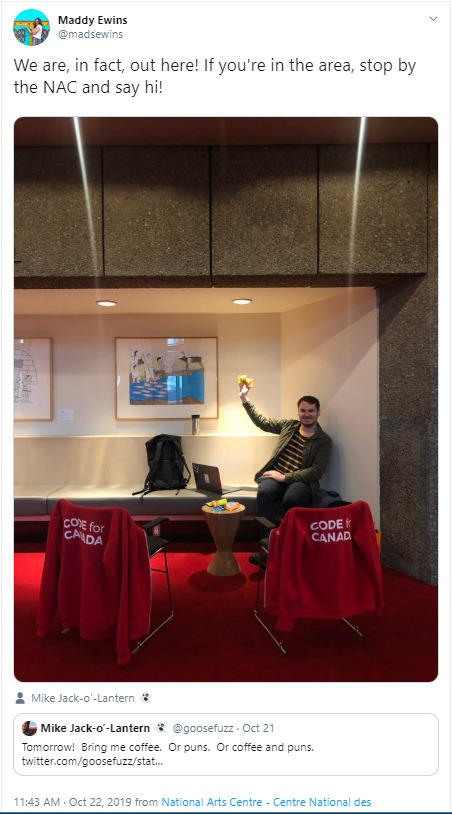
https://twitter.com/madsewins/status/1186669339119947776
We were delighted to join the TCUX Meetup (Transport Canada User Experience). Thanks to Noah for the invite, and Andee for singing it from the rooftops! We had a great conversation about using prototypes to “show the thing,” have better conversations, and learn quickly.
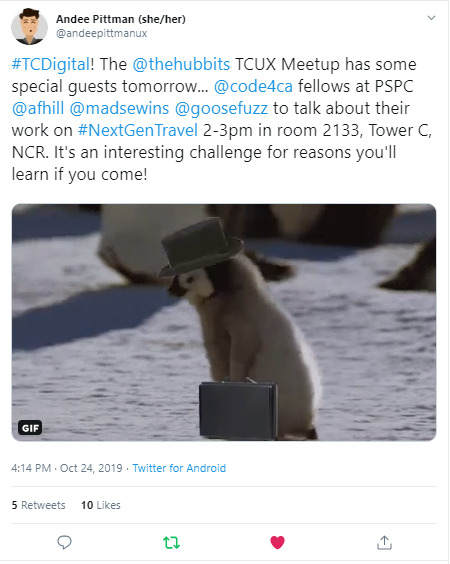
https://twitter.com/andeepittmanux/status/1187462321754562561
We’re busy revving up for CanUX and FWD50. We’ll also be sharing more about our project at the Code for Canada Open House on November 6th. Join us!
1 note
·
View note